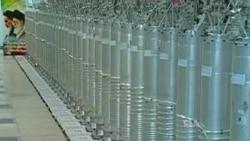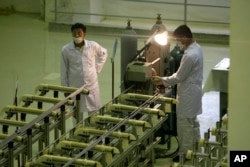After more than two years of tough negotiations with world powers, Iran says it is close to meeting the requirements of a nuclear agreement that would bring it relief from crippling international nuclear-related sanctions.
President Hassan Rouhani says that by mid-January, Iran should reach what negotiators have dubbed Implementation Day — the day in which Tehran would be freed from these sanctions because of compliance with provisions in the agreement, known as the Joint Comprehensive Plan of Action, or JCPOA.
It remains unclear whether Iran has made enough progress for a January implementation, which would ultimately be determined by the International Atomic Energy Agency.
Secretary of State John Kerry, however, submitted a periodic certification letter to the Senate Foreign Relations Committee on December 16, which indicated progress from the U.S. perspective.
Kerry said Iran had been "transparently, verifiably and fully implementing" the JCPOA and had not taken action, including covert activities, that could significantly advance a nuclear weapons program.
Safety, opportunity
Overall, Iran has several major hurdles to clear in order to receive sanctions relief, including the removal of thousands of centrifuges, which are used to enrich uranium, and the redesign of a heavy water reactor so that it cannot produce weapons-grade plutonium.
If it meets these requirements, the benefits for the international community could be significant, said Stephen Mull, the lead U.S. coordinator for Iran nuclear implementation.
"If we are successful in this deal, not only is it going to make us and our friends in the region a lot safer and a lot more secure, it opens up all sorts of opportunities for our diplomacy," said Mull at a Washington forum.
There are, however, ongoing concerns about Iran's activities outside of the nuclear agreement, reached in July, and whether sanctions relief could lead to greater Iranian defiance.
"The agreement is off to a really terrible start," said Senate Foreign Relations Committee chairman Bob Corker.
Growing concerns
In a December hearing that included Mull, Corker checked off a list of concerns about Iran's activities outside of the agreement.
"Since the agreement was signed, Iran has convicted an American Washington Post reporter, launched cyberattacks against the State Department, defied a U.N. travel ban and sent [Iranian Quds Force Commander Qassem] Soleimani to Russia, exported weapons to Syria and Yemen, and then violated the U.N. ballistic missile test ban twice," Corker said.
He said there was no evidence of Iran "paying a price" for these actions.
Some analysts have questioned if the agreement itself will have the intended results.
"How are we capable of making sure they don't have other facilities that they are trying to open up," asked Blaise Misztal of the Bipartisan Policy Center. "After all, each of the facilities we are inspecting today was at one point a covert site that Iran was trying to hide from the world."
Others say the long-term economic benefits for Iran that would result from sanctions relief could be enough to compel it to stay in compliance with the agreement.
"What we are looking for is a process that reintegrates Iran in such a way that Iran will be more forthcoming in the future. Iran will be less likely to obfuscate and to lie," said Ilan Berman of the American Foreign Policy Council.
In the end, world powers and Iran may have to move beyond Implementation Day, before it becomes clear whether Tehran intends to uphold the agreement for the long haul, Mull said.
He added that if implementation of the nuclear agreement goes well, it could create more "good faith" on both sides that could clear the way for cooperation between the U.S. and Iran on other issues.






